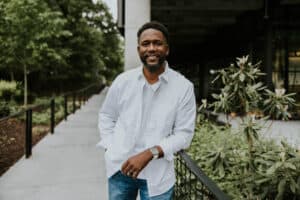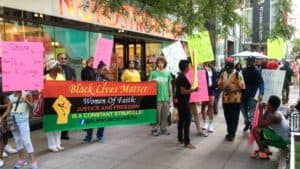 (Editor’s note: This is Part 2 of a 4-part series on economic injustice. In his first post, Terence Lester exposes the spiritual and systemic crisis of “educational redlining” and calls the church to defend the futures of marginalized students. In this post, he challenges churches to move beyond charity toward justice, and he calls for a public theology that repairs harm, confronts systems of oppression, and lives out the liberating Good News of Jesus.)
(Editor’s note: This is Part 2 of a 4-part series on economic injustice. In his first post, Terence Lester exposes the spiritual and systemic crisis of “educational redlining” and calls the church to defend the futures of marginalized students. In this post, he challenges churches to move beyond charity toward justice, and he calls for a public theology that repairs harm, confronts systems of oppression, and lives out the liberating Good News of Jesus.)
____
When I hear the word “charity” in the context of the church, I cannot help but think about the difference between personal theology and public theology.
Personal theology is how faith is lived out and experienced on an individual level where one develops what many would consider a personal relationship with God. Out of that sacred commitment and journey one engages in spiritual practices that deepen belief: devotion through reading sacred texts, prayer, fasting, worship, confession, solitude, or acts of service through the church that is sometimes called outreach.
Those acts often take the form of compassionate acts of charity: giving food to those who are hungry, clothing to those who are unhoused or impoverished, or meeting immediate needs. Some churches even dig wells so people in other countries can have clean drinking water. Scripture affirms this work:
“If a brother or sister is naked and lacks daily food, and one of you says to them, ‘Go in peace; keep warm and eat your fill,’ and yet you do not supply their bodily needs, what is the good of that?” (James 2:15–16, NRSV)
Churches celebrate this—and they should, because it is good. I believe that these acts are important and deeply meaningful and that we need more of them. Someone will go to bed hungry tonight. Some children live in shelters. Many impoverished neighborhoods, like the one I grew up in, lack grocery stores with access to fresh produce.
But on their own, these charitable acts of service do not address the systems of injustice that create those needs. In many cases, these compassionate acts can even create distance between giver and receiver, making it transactional and leaving injustice unaddressed altogether.
I have worked alongside and consulted several predominantly white churches that had good intentions, but the distance created by their charitable acts often undermined the dignity of the person or community they served. The giver (the church) remained in control, while those receiving support (those experiencing poverty) were kept dependent. All the while, no real relationship was established. Too often, no one took the time to ask the deeper question: Why are these acts of service needed in the first place, and what needs to be corrected or addressed?
Public theology, on the other hand, asks what God has to say about what is happening in the world and what we should do about it.
In Social Justice Handbook: Small Steps for a Better World, Dr. Mae Elise Cannon unpacks the meaning of righteousness and justice to frame biblical justice.[1] In the Hebrew text, righteousness translates from tsedeq (צֶדֶק). According to Strong’s Concordance, it refers to rightness, integrity, justice, or moral order.[2] This meaning goes beyond moral correctness to point toward the “right posture of the heart,” a relational integrity and covenant faithfulness rooted in God’s character that shapes how we live and interact justly.
On the other hand, justice comes from mishpat (מִשְׁפָּט). Strong’s defines it as judgment, justice, legal decision, or ordinance.[3] It speaks to “right action lived out,” the societal structures, laws, and judgments necessary to uphold fairness, equity, and justice for all oppressed. The prophet Amos said,
“Let justice (mishpat) roll down like waters, and righteousness (tsedeq) like an ever-flowing stream” (Amos 5:24).
Micah wrote that what the Lord requires is to “do justice, love mercy, and walk humbly with your God.” Biblical justice always holds heart (tsedeq) and action (mishpat) together.
This deeper understanding moves the church to consider how it might respond to unjust actions in the world that literally harm people. I believe that public theology has the power to move our personal beliefs into how we show up in the world, or as Jesus puts it, in “the highways and byways…” (Luke 14:23)—not just to give hand outs to people in need without connection, but instead to stand with and truly know the people who are harmed by injustice, walking alongside them in real time and addressing the wrongs that create their need.
Could the church that is silent in times of political harm, war, genocide, social and political violence and division, racism, and white supremacy rely too much on personal theology, hoping that injustice will correct itself through personal devotion?
This, in many cases, has been seen as the opposite witness of the Good News to many people who actually question the church and its motives. The silence of the church is unsettling in the face of public injustice when it should speak out and direct people to God’s love, which has a different standard that is greater than the injustice and harm that impacts the lives of everyday people.
I believe that the difference between the personal and the public witness is what happens beyond a charitable outreach moment that the local and universal church engages in.
Public theology in the church doesn’t just hand out the sandwich; it asks why people are hungry and what needs to be corrected to ensure that everyone has access to food.
It doesn’t just give hygiene kits to those who are unhoused; it questions why cities sweep encampments and close shelters without offering access to housing-first programs.
It does not just sit by and watch Black students lose funding, healthcare support, after-school programs, and school lunches. It speaks out with a moral witness and stands with those who are in need of love when injustice is loud.
Why? Because God loves those who are harmed by wrong actions and injustice.
When we rely solely on personal theology in the church without public theology, the church fails to be the light on the hill and finds itself sitting silently while suffering continues in communities harmed by injustice, leaving people to wonder if the church is complicit. Theologians like Howard Thurman described Jesus’ ministry as a faith for those with their “backs against the wall,” because Jesus himself lived that reality, being born a minority under Roman occupation, impoverished alongside his earthly parents.[4]
In Jesus’ own life we see that the gospel is public, not just private.
Dr. Martin Luther King Jr. warned that “philanthropy is commendable, but it must not cause the philanthropist to overlook the circumstances of economic injustice which make philanthropy necessary.”[5] King was right, and the church must watch itself. We are living in sensitive times that will require another form of witness that is still rooted in the Good News—whether that be praying and protesting against injustice, singing in worship and signing petitions to push back against unethical voter gerrymandering, worshiping and watching and listening in on political council meetings, or reading the text and being committed to resistance.
It is the both/and of the theological witness that moves the church beyond charity.
And in this moment in time, some churches are recovering this public theology. For instance, Faith in Action, a national network, organizes congregations to push for immigration reform, police accountability, and housing justice.[6]
Similarly, the Poor People’s Campaign gathers churches, allies, and individuals across traditions to confront poverty and systemic racism through lobbying, public witness, and direct action to fight against poverty and for livable wages.[7]
And while these are organizations, churches from all walks of faith are joining in.
Today, as many forms of social injustice—including educational injustice, and an anti-intellectualism that is masked as patriotism—continue to rise, the church could choose charity rather than step up to fight the injustice that creates the need for that charity.
If our love stays locked inside sanctuaries defined by personal devotion, expressed only through seasonal outreach, then the church must ask itself why its theology isn’t more public. Jesus declared in Luke 4:18–19 that he came to bring good news to the poor, release to the captives, and freedom for the oppressed. That is not charity; that is liberation.
I believe what we need right now are reparative churches. Reparative churches cry out for equitable education. They cry out for access to housing. They cry out for a living wage. They cry out for disability protections. They cry out against harmful immigration practices.
They fund scholarships for first-generation Black students, create tutoring programs when Title I schools experience funding cuts, and stand with unhoused families in the fight for housing and dignity. They repair social wrongs by acting; reparative churches see injustice not as political but as a fight for biblical justice during social moments that create social and spiritual crises.
I believe the choice before the church is clear. It will either remain silent or it will move from an exclusively personal and charitable approach to the truly Good News of Jesus—a living, active, justice-engaged public theological stance.
References:
[1] Mae Elise Cannon, Social Justice Handbook: Small Steps for a Better World (Downers Grove, IL: InterVarsity Press, 2009).
[2] BibleHub. “Strong’s Hebrew: 6664. צֶדֶק (tsedeq) — righteousness, justice, rightness.” Accessed September 7, 2025.
[3] BibleHub. “Strong’s Hebrew: 4941. מִשְׁפָּט (mishpat) — judgment, justice.” Accessed September 7, 2025.
[4] Howard Thurman, Jesus and the Disinherited (Boston: Beacon Press, 1976).
[5] Martin Luther King Jr., Strength to Love (Philadelphia: Fortress Press, 1963).
[6] Faith in Action, accessed September 2025.
[7] Poor People’s Campaign, “About the Campaign,” accessed September 2025.
 Dr. Terence Lester is a storyteller, public scholar, community activist, and author. He founded Love Beyond Walls, a nonprofit committed to raising awareness about poverty and homelessness, and teaches public policy and social change at Simmons College of Kentucky. His latest book, From Dropout to Doctorate: Breaking the Chains of Educational Injustice (IVP, 2025), traces his journey from high school dropout to PhD and issues a bold call for equity. Through his life and writing, he uses narrative, policy insight, and faith to challenge systems that leave people invisible and to inspire practical change.
Dr. Terence Lester is a storyteller, public scholar, community activist, and author. He founded Love Beyond Walls, a nonprofit committed to raising awareness about poverty and homelessness, and teaches public policy and social change at Simmons College of Kentucky. His latest book, From Dropout to Doctorate: Breaking the Chains of Educational Injustice (IVP, 2025), traces his journey from high school dropout to PhD and issues a bold call for equity. Through his life and writing, he uses narrative, policy insight, and faith to challenge systems that leave people invisible and to inspire practical change.


